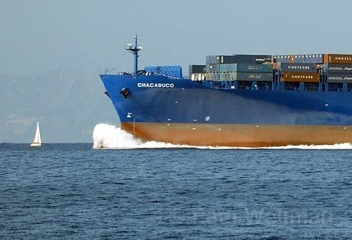
Five environmental organizations have filed a legal petition asking NOAA to enforce speed limits in National Marine Sanctuaries off the California coast. If NOAA does not take action within a year, the groups say they may sue to under the Marine Mammal Protection Act. “Our marine sanctuaries should be a safe harbor for marine life, but instead whales in California are at constant risk of being run over by big ships,” said Miyoko Sakashita, oceans director at the Center for Biological Diversity. “Mandatory speed limits for ships traveling through our marine sanctuaries will save whales and clean our air.” Slower ship speeds also significantly reduce a ship’s noise, which could be a welcome relief in such a heavily trafficked area.
In the past decade, nearly 50 large whales off California have been struck by ships. Last year, at least six were killed in collisions. A key factor in the decision about lowering ship speeds is likely to be whether the loss of less than ten whales a year warrants the change (more whales may be struck and sink without being seen). Along portions of the East Coast, federal authorities have imposed a 10-knot speed limit for ships 65 feet or longer for the past several years in order to protect the North Atlantic right whale, which is critically endangered, numbering only around 300 animals, so the loss of any individual is a blow to the population’s future.
The groups are advocating a similar mandatory speed limit of 10 knots (about 11 mph) for all ships larger than 65 feet while sailing through California’s four national marine sanctuaries, which stretch from the Marin Headlands north of San Francisco, 300 miles down the coast to the Channel Islands north of Los Angeles. Ship speeds are now usually 13-25 knots. Since 2007, when four blue whales were struck by ships near the Channel Islands National Marine Sanctuary, NOAA has issued seasonal bulletins urging a 10 knot speed limit from May-December, when the blues are most numerous; environmental groups say most ships ignore this voluntary advisory, while shipping groups say most ships do adhere to it.
